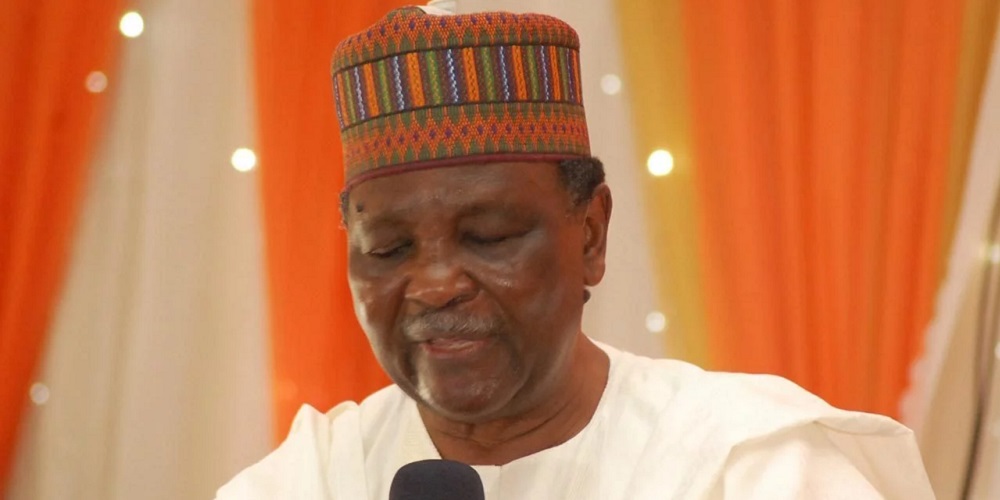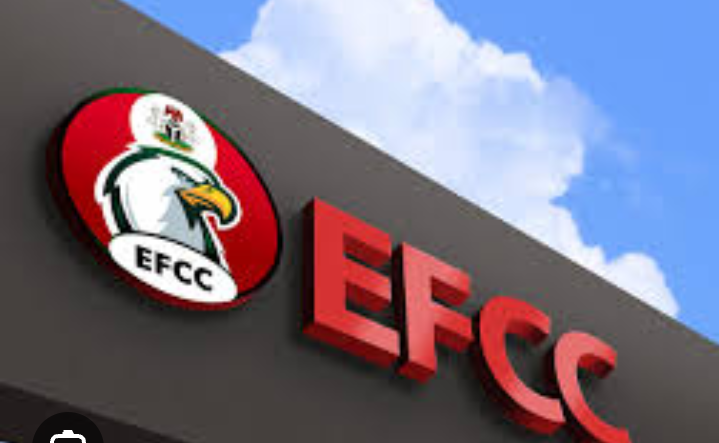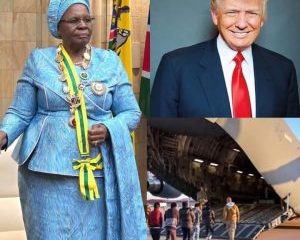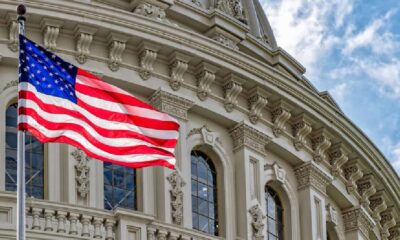News
Gowon urges ECOWAS to lift sanctions on Mali, Burkina Faso, Niger

Former Nigerian head of state and one of the founding fathers of the Economic Community of West African States, Yakubu Gowon, has urged the regional political and economic union to lift sanctions on Mali, Burkina Faso and Niger Republic.
Gowon made the call in an open letter to the Heads of State and the ECOWAS member states on Wednesday.
Widely seen as West Africa’s top political and regional authority, the 15-nation bloc of ECOWAS – formed in 1975 to promote economic integration in member states – has struggled in recent years to reverse a wave of military takeovers in the region, including Mali in 2020 and 2021, Burkina Faso in 2022 and Niger last year.
Members of the fifteen-nation bloc (excluding the four members suspended since falling under military rule – Burkina Faso, Guinea, Mali and Niger), along with the eight-member West African Economic and Monetary Union, agreed to close all borders with Niger, suspend financial transactions and freeze the country’s assets in external banks.
The three countries, which mulled a counterforce, the Alliance of Sahel States, against the regional bloc after the overthrow of the democratically elected government in Niger, announced their exit from ECOWAS on Sunday, January 28, 2023.
In a joint statement by their military leaders, Capt. Ibrahim Traoré (Burkina Faso), Col. Assimi Goita (Mali), and Brig. Gen. Abdourahamane Tiani (Niger Republic), the three countries announced their withdrawal from ECOWAS with immediate effect.
The three countries, which are currently under military rule, said they ceased to be members of ECOWAS as the regional body had allegedly “moved away from the ideals of its founding fathers and pan-Africanism.”
They claimed that ECOWAS had become a threat to its member states.
Gowon, who presented the letter to the President of the ECOWAS Commission, Omar Touray, in Abuja at a press conference, expressed concern that the pronouncement by Burkina Faso, Mali and Niger Republic to exit from ECOWAS threatens the unity of the bloc and has far-reaching implications for ordinary citizens.
He said, “It saddens me to learn that ECOWAS is threatened with disunity following the announcement by Burkina Faso, Mali and Niger, three important Member States, of their intention to leave the Community.
“The impact of such a decision will have far-reaching implications for the ordinary citizens who have been the major beneficiaries of regional integration.”
Gowon called on the ECOWAS authorities to immediately consider the implementation of the “lifting of all sanctions that have been imposed on Burkina Faso, Guinea, Mali and Niger.”
He appealed to the ECOWAS Authority of Heads of State and Government, including leaders of Burkina Faso, Mali and Niger, to re-unite for peace and stability in the region.
“Therefore, on behalf of all the founding fathers of the Community and myself, I urge the ECOWAS Authority of Heads of State and Government, including the leaders of Burkina Faso, Mali and Niger, to put aside their differences and reunite for the peace, stability and prosperity of our sub-region,” Gowon said.
News
Presidency slams El-Rufai over plot to woo Buhari

The Presidency and the ruling All Progressives Congress have dismissed the prospect of any opposition coalition unseating President Bola Tinubu in 2027, describing recent moves by former Vice President Atiku Abubakar and ex-Kaduna State Governor, Nasir El-Rufai, as futile and politically opportunistic.
Their reactions followed the high-profile visit by Atiku and El-Rufai—accompanied by former governors Aminu Tambuwal (Sokoto), Gabriel Suswam (Benue), Jibrilla Bindow (Adamawa), and Achike Udenwa (Imo)—to former President Muhammadu Buhari at his Kaduna residence last week.
Although Atiku maintained the visit was merely a post-Sallah courtesy call, political observers and members of the ruling party believe it was part of broader opposition coalition talks aimed at weakening Tinubu’s political base.
“There is a plan for the major political parties to come together and form a strong opposition. But it is not part of our visit,” Atiku told reporters.
In recent weeks, concerns have risen within the APC over speculated coalition efforts and the potential exit of the Congress for Progressive Change bloc from the party, following defections to the Social Democratic Party.
But the APC’s National Secretary, Senator Ajibola Bashiru, waved off the speculations in a phone interview with The PUNCH, questioning the credibility of the so-called CPC defection narrative.
“It is not true. Which CPC bloc did you people say is leaving? Was El-Rufai or Atiku a CPC member? Is our Vice National Chairman (North-West), Garba Datti Mohammed, and even former Governor Al-Makura not in the CPC? Have you heard any of them saying he is leaving?” Bashiru queried. “I don’t know why the media keeps giving these sorts of people unnecessary attention.”
Also reacting, President Tinubu’s Special Adviser on Policy Communication, Daniel Bwala, criticised the coalition talks, dismissing them as a desperate power grab by political misfits with no shared ideology.
“This coalition is an association to grab power,” Bwala said. “That’s why you will hear Peter Obi say they are only there to grab power. Tomorrow, he will say he is considering joining. As for my senior brother, El-Rufai, I like what he is doing. He is using them to play ping pong.”
Bwala added that internal resistance within the Peoples Democratic Party had already disrupted El-Rufai’s attempts to lure the opposition into the SDP.
“When El-Rufai came, he thought he would move all of them to SDP. But His Excellency (Sule Lamido) screamed, ‘Hold it there!’ He reminded them that it was the PDP that made El-Rufai minister twice and gave him political relevance. Now, he wants to drag them out? We’re not going anywhere,” Bwala recounted.
The Presidency insists that despite the rising political noise, President Tinubu remained focused on governance and would not be distracted by alliances it described as unstable and self-serving.
Credit: PUNCH
News
Court dismisses suit seeking Oyo monarch’s removal

An Oyo State High Court sitting in Ibadan has dismissed a suit contesting the nomination and installation of the Olugbon of Orile Igbon, Oba Francis Alao.
In his ruling on Monday, Justice K.A. Adedokun nullified the case for lack of jurisdiction.
Four members of the Akingbola family who instituted the suit contested the selection, appointment, and approval of Oba Alao as the Olugbon.
Justice Adedokun held that the court lacked the jurisdiction to entertain the matter, saying that the claimants had no locus standi to file the suit.
He ruled that the case was defective as it failed to include Surulere Local Government, the authority legally empowered to initiate the selection process and approve the traditional ruler’s appointment.
Oba Alao, whose installation as Olugbon was ratified by the Oyo State government and traditional institutions, is the current vice chairman of the Oyo State Council of Obas and Chiefs.
News
EFCC arraigns Chinese for giving false information in Lagos

The Economic and Financial Crimes Commission (EFCC) has arraigned a Chinese, Liu Beixiang, over alleged false information to an officer of the agency.
Liu was arraigned yesterday before Justice Ayokule Faji of the Federal High Court sitting in Ikoyi, Lagos.
The charge reads: “That you, Liu Beixiang (a.k.a Lao Liu), sometime in December 2024 in Lagos, within the jurisdiction of this honourable court, did give information, which you knew to be false, to an officer of the Federal Government of Nigeria in the discharge of his duties and thereby committed an offence contrary to Section 16 (1) of the Economic and Financial Crimes Commission (Establishment) Act, 2004.”
The defendant, however, pleaded not guilty to the offence when the charge was read to him. In view of his plea, the prosecution counsel, Babatunde Sonoiki, asked the court for a trial date and also prayed that the defendant be remanded in a correctional facility.
But in his response, the defence counsel, F.A. Dalmeda, informed the court of an application submitted to the EFCC seeking a plea bargain.
“We filed an application for a plea bargain, and we also filed a motion for bail, which the EFCC responded to this morning.
“We need a date for us to report on the plea bargain.
Consequently, Justice Faji adjourned the matter till June 23, 2025, for a report on the plea bargain and remanded the defendant in a correctional centre.
-

 News18 hours ago
News18 hours agoJust in: Namibia Moves to Deport Over 500 Americans in Bold Visa Policy Shift
-

 News18 hours ago
News18 hours agoRivers women rally in support of state of emergency
-

 News13 hours ago
News13 hours agoYou must refund N300m, Rivers State tells NBA
-

 Politics17 hours ago
Politics17 hours agoBwala accuses Senator Ndume of plans to defect from APC
-

 Foreign14 hours ago
Foreign14 hours agoUS orders 30-day registration for all foreign nationals or face jail, deportation
-

 News18 hours ago
News18 hours agoSoldiers rescue 16 kidnapped passengers in Plateau
-

 News16 hours ago
News16 hours agoPolice sack officer who killed one, injured two in Calabar
-

 News18 hours ago
News18 hours agoGunmen invade Plateau community in fresh attack, Kill 40 People





